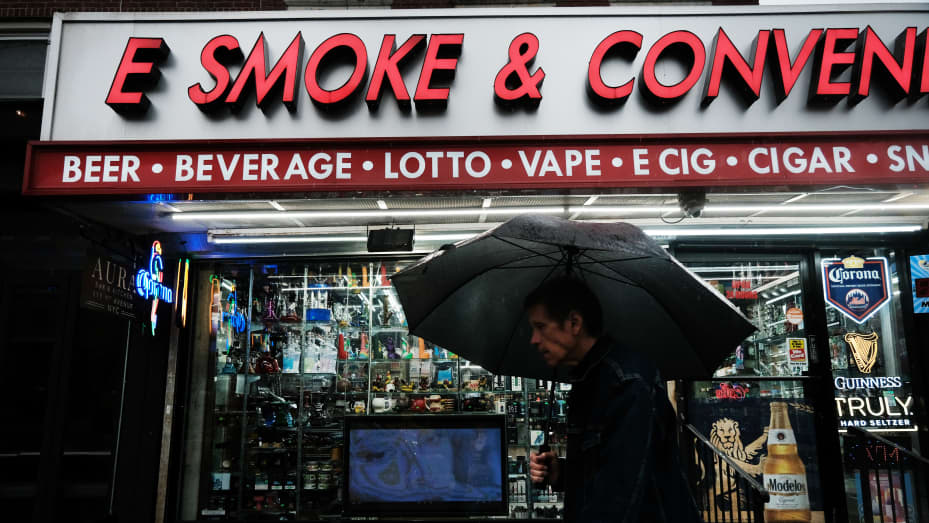A pedestrian passes a smoke shop in New York City on June 16, 2023. New York authorities are cracking down on unlicensed smoke shops that are selling cannabis.
New York officials are ramping up efforts to stop the statewide proliferation of unlicensed smoke shops selling marijuana, as the state struggles to boot up its legal marketplace.
Since cannabis became legal in the state in 2021, thousands of unlicensed vendors selling marijuana, edibles, vape products and more have been undermining the state’s legal weed industry, with the issue being most pronounced in New York City. Currently, there are just 23 legal dispensaries open across the state, with only nine in New York City.
A new report by New York City’s Independent Budget Office determined that an estimated 1,500 unlicensed retailers in the city may hold as much as $484 million worth of marijuana products. If all those items were sold legally, the sales would generate $19.4 million in revenue for the city, the report found.
The state has started to crack down on the unlicensed shops by increasing inspections of stores, which can face fines or closure. But its effort has only begun to chip away at the vendors, particularly in New York City.
“We’re getting to as many as we can,” said Daniel Haughney, enforcement director at the state Office of Cannabis Management, in an interview with CNBC.
A notice from New York state’s Office of Cannabis Management posted in a storefront window in New York City announces the seizure of “illicit cannabis” at the business, June 16, 2023.
The state is employing increasingly aggressive tactics to curb the growth of weed’s black market, which consumers often turn to for cheaper, untaxed product. Cracking down on the stores is not only a legal consideration but also an economic one, as illicit sales do not bring revenue to the state. New York imposes a retail tax of 13% on all marijuana products and an additional tax based on potency levels of tetrahydrocannabinol, or THC, marijuana’s psychoactive component.
In addition to skirting the tax system, smoke shops operating illegally may also pose significant health risks. A 2022 study commissioned by the New York Medical Cannabis Industry Association that reviewed products from 20 illicit stores in New York City found about 40% contained harmful contaminants such as E.coli, lead and salmonella.
The state’s Cannabis Control Board announced Tuesday that it will make more licenses available by opening up applications to the general public as well as large multistate manufacturers and medical companies. Previously, retail licenses were limited only to applicants with prior marijuana-related convictions, under the state’s Conditional Adult Use Retail Dispensary, or CAURD, program. The move is expected to add more legal shops to the state.
How New York’s illegal weed crackdown is working
Haughney said his team, with the help of the Department of Taxation and Finance, has been increasing inspections at storefront businesses “throughout the entire state.” Officials began ramping up efforts in June.
“We’re hitting them with everything that we can,” he added.
If an illegal business fails to comply with violation notices and cease-and-desist orders, it can be subject to a seizure of product, closure of a store and daily fines that can reach $20,000.
The crackdown has moved beyond the operators of the stores.
In August, New York City enacted legislation that targets landlords who knowingly lease commercial real estate to unlicensed sellers. Under the bill, landlords can be fined up to $10,000 for raids on their property that yield illegal weed.
The Real Estate Board of New York supported the city’s bill, saying it provides “much-needed enforcement” that will “improve streetscapes” across New York City’s five boroughs.
“This commonsense law will keep bad actors out of commercial spaces and help ensure that real estate brokers and property owners are working with properly licensed retail establishments,” the board said in a statement to CNBC.
With each of these measures, Haughney said his team is beginning to see “more and more compliance.”
“As you see enforcement continue and as more and more licenses are issued for legal operators, you’ll see a shift happen where you’ll see less and less of the illegal shops,” said Haughney.
H/T: www.cnbc.com



